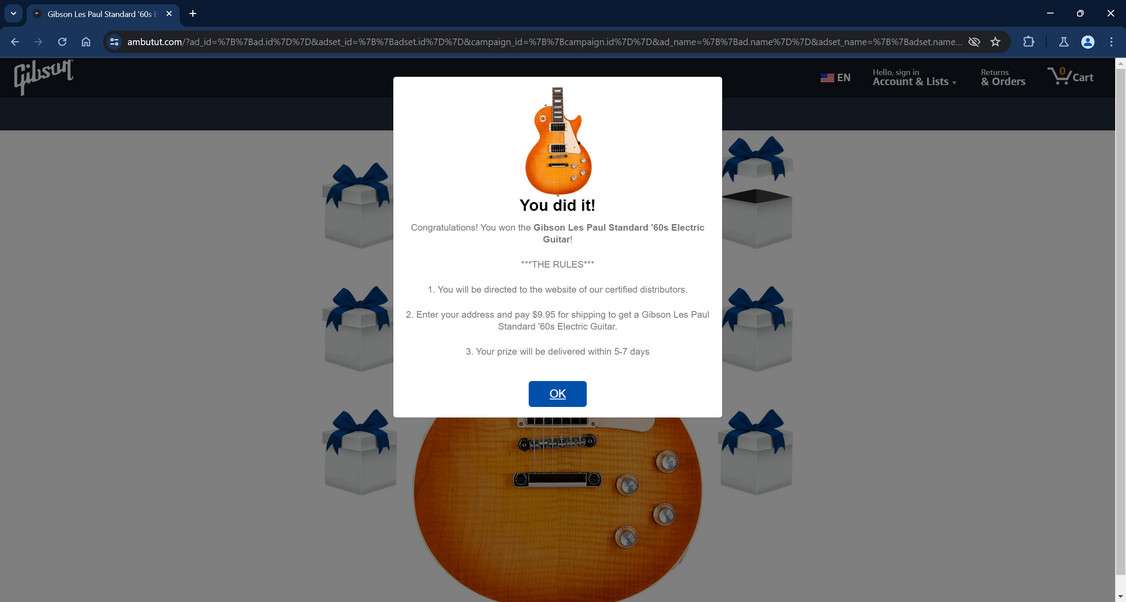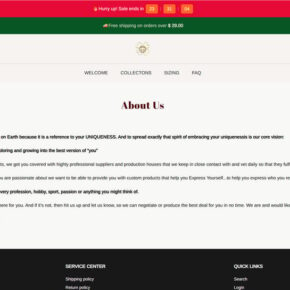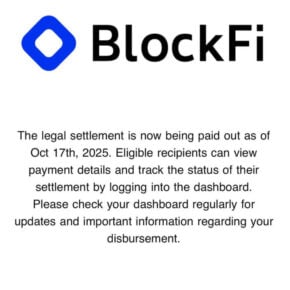A fraudulent giveaway promotion is circulating on social media deceitfully leveraging the Sweetwater and Gibson brands to lure in victims. Utilizing fake endorsements and deepfake technology, this scam ensnares consumers through an intricate sequence of deceptions.
- Overview of the Sweetwater Gibson Les Paul Guitar Giveaway Scam
- How the Sweetwater Gibson Les Paul Guitar Giveaway Scam Works
- What to Do if You Fell Victim to the Sweetwater Gibson Guitar Scam
- Recognizing the Sweetwater Gibson Les Paul Guitar Scam (And Avoiding It)
- Shutting Down the Les Paul Guitar Giveaway Scams
- Frequently Asked Questions About the Fake Gibson Guitar Giveaways on Social Media
- The Bottom Line
This in-depth guide will uncover the truth behind these fabricated Les Paul guitar giveaways, analyze their devious tactics, and provide consumers with the knowledge to recognize and report this scam. Armed with greater awareness, we can work together to protect innocent social media users from these orchestrated cyber crimes.
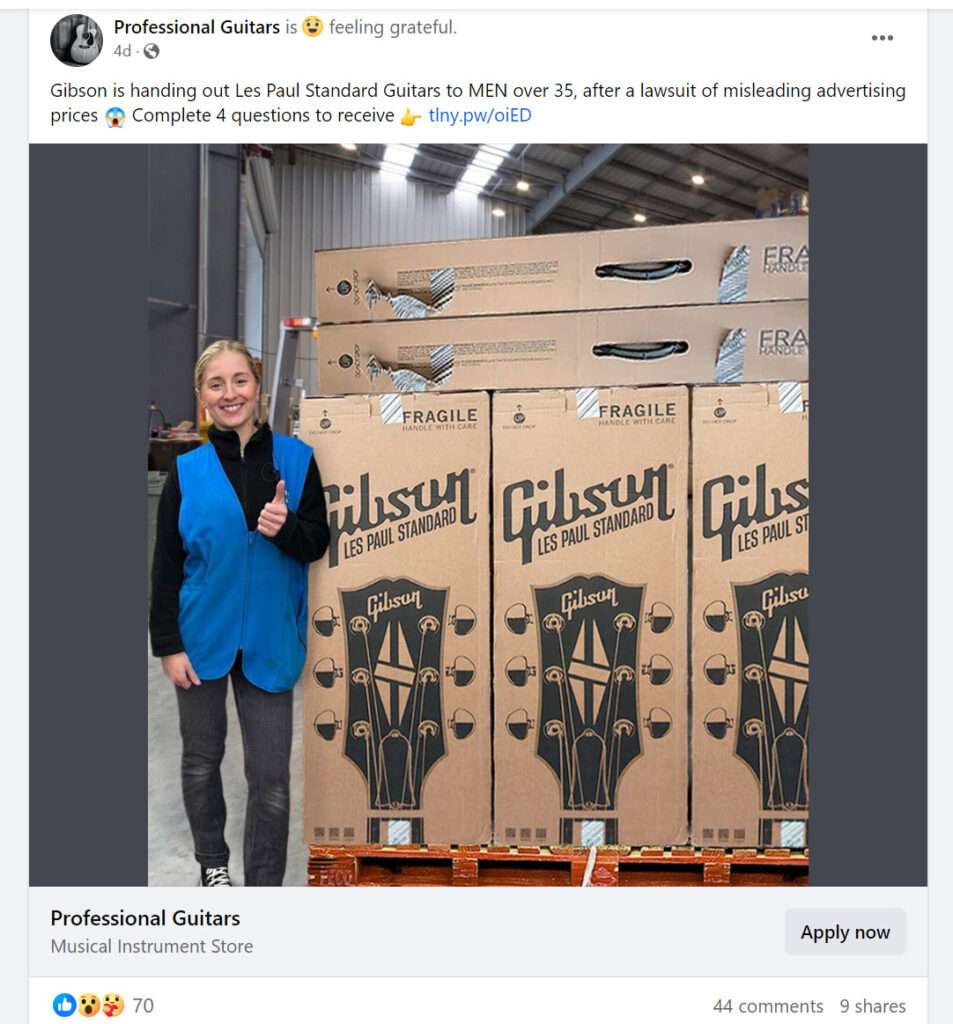
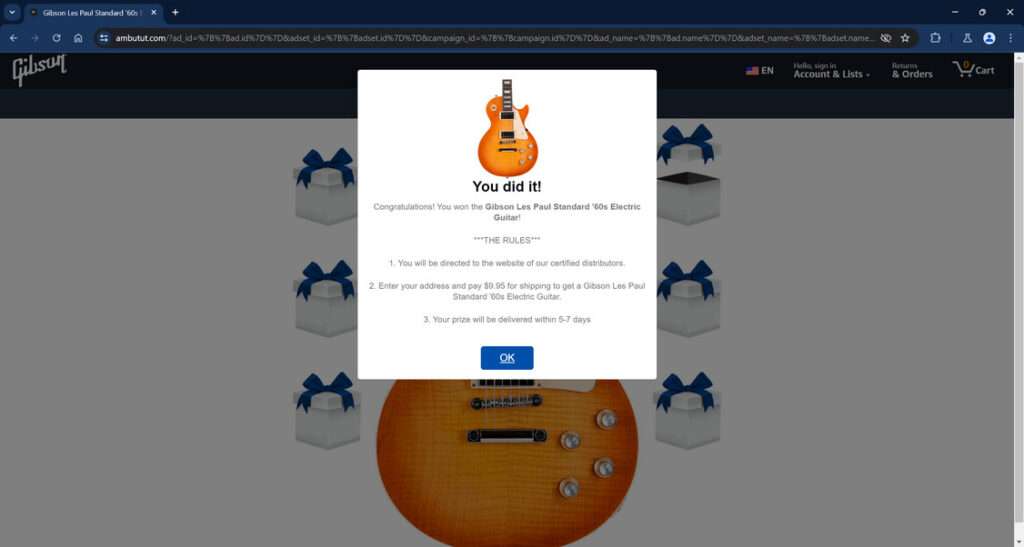
Overview of the Sweetwater Gibson Les Paul Guitar Giveaway Scam
This widespread scam leverages the reputation of musical equipment retailer Sweetwater and iconic guitar brand Gibson. It constructs an elaborate facade to convince victims they can obtain expensive Les Paul Standard guitars completely free.
The scam starts with sponsored video ads across sites like TikTok, Facebook and Instagram. Using deepfake technology, the ads portray fake Sweetwater employees or representatives announcing an exclusive giveaway.
Reasons cited include clearing out excess inventory, leftovers from canceled bulk orders, or product labeling errors. The consistent narrative promotes urgency and exclusivity.
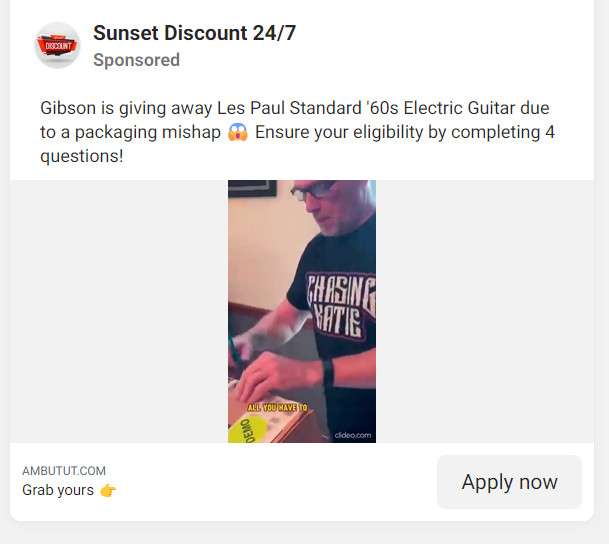
Hooked viewers are funneled through various deceptive websites, phishing forms, and requests for shipping fees. In reality, these small charges enable recurring subscription sign-ups, through which the scammers steal hundreds per month. No free guitars are ever shipped.
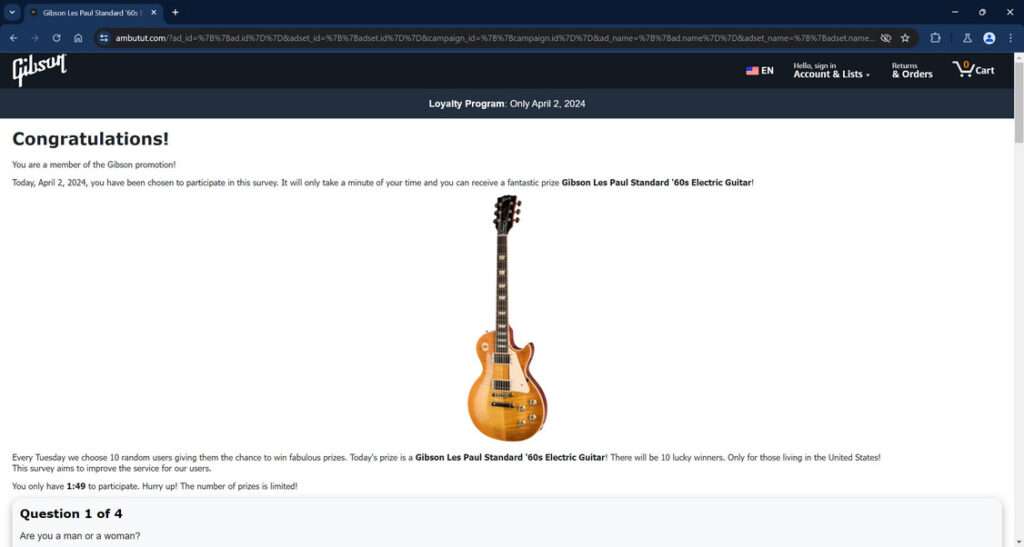
To construct this false allure, the scam utilizes:
- Deepfake videos of Sweetwater staff offering Les Pauls
- Fake Sweetwater and Gibson websites mimicking their brands
- Phony news reports lending credibility
After luring potential victims via social media, it directs them through a sequence of deceptions, including:
- AI-generated blog posts supporting the phony giveaways
- Mocked up Sweetwater product listing pages
- Requests for credit cards under the guise of “shipping fees”
Submitting payment info covertly enrolls users in expensive recurring subscription plans without their consent. The scammers behind this criminal operation profit while the victims receive nothing.
This scam has been also investigated by Jordan Liles on his YouTube channel, where he offers a detailed video on the subject. We recommend watching his content for a comprehensive understanding of the scam.
Next, let’s break down exactly how scammers carry out this scam from start to finish.
How the Sweetwater Gibson Les Paul Guitar Giveaway Scam Works
This scam is elaborate in its deceptions, leveraging nearly every technique fraudsters use to successfully manipulate victims. Here is an in-depth look at how it ensnares social media users step-by-step:
1. Hook Victims with Deepfake Social Media Ads
The scam begins by blanketing social sites like Facebook, Instagram, YouTube, and TikTok with video ads portraying Sweetwater employees announcing Les Paul Standard guitar giveaways.
But rather than real Sweetwater staff, the videos feature deepfakes – AI-generated manipulations combining real Sweetwater footage with computer-generated faces and voices. The quality is convincing, down to accurately lip-syncing the fabricated dialogue.
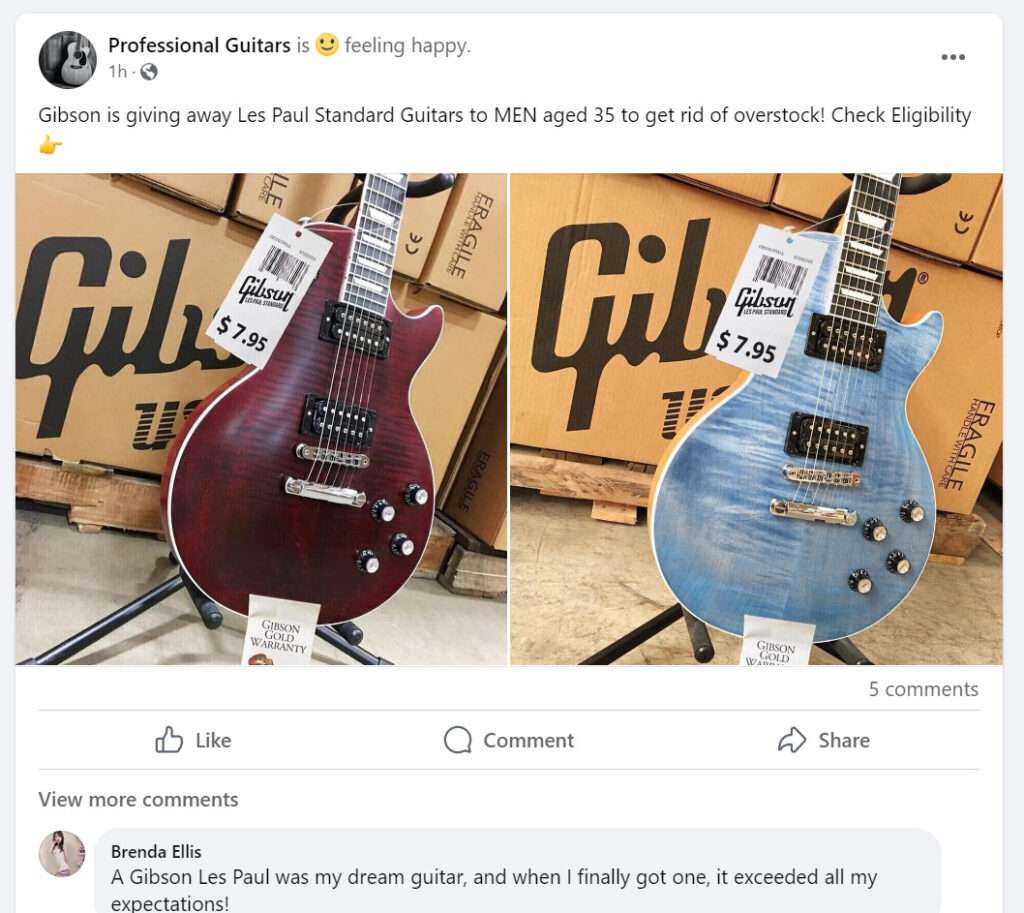
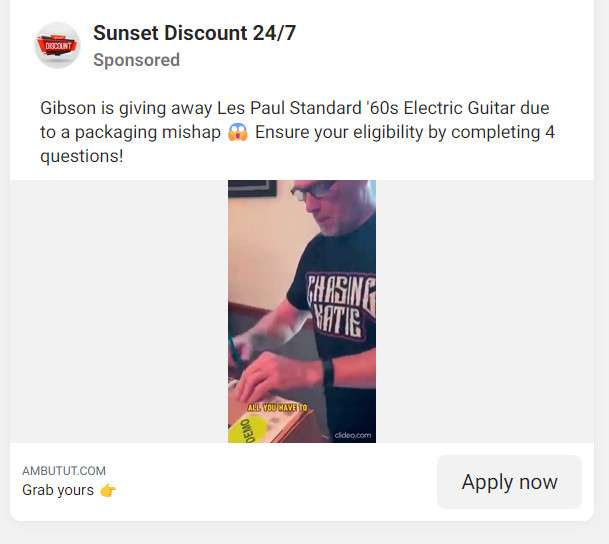
The consistent narrative across these deepfake ads cites various false reasons for gifting the pricey guitars worth over $2,000. Examples include:
- Clearing out old inventory after a naming rebrand
- Damaged product boxes from mishandling
- Excess stock after order cancellations
By citing these reasons, the scam implies the guitars themselves are all top-notch quality. The deepfake Sweetwater reps strongly urge viewers to click through quickly, promoting urgency and exclusivity with limited supply.
In reality, there is no relationship between these ads and Sweetwater or Gibson. But the deceptive quality convinces many viewers the giveaway is legitimate.
2. Lend Credibility Via Fake News Reports
Clicking the link in the social media ads brings users to phony “news” articles published on fake domains impersonating media outlets.
These articles echo the fictional narrative about excess guitar inventory using natural writing and SEO keywords to boost search visibility. Logos from sites like Fox Business, USA Today, and the Chicago Tribune are used without consent.
The fake articles feature high-resolution Les Paul product shots, spec sheets, and images from Sweetwater’s facilities. This lends further credibility to the scam’s premise.
Of course, none of these false news reports are affiliated with real media outlets in any capacity. They solely exist to reinforce the fake giveaway’s legitimacy at face value.
3. Mask Phishing Sites as Sweetwater Domains
After consuming the bogus news stories, users arrive at mocked up Sweetwater product listing pages for the Les Paul Standard guitars.
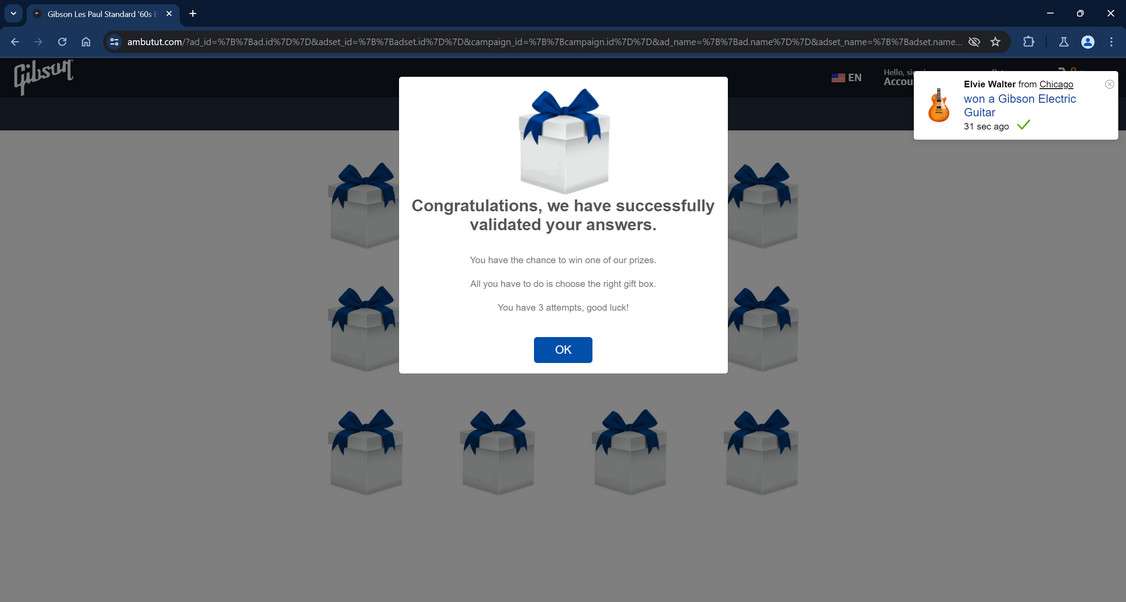
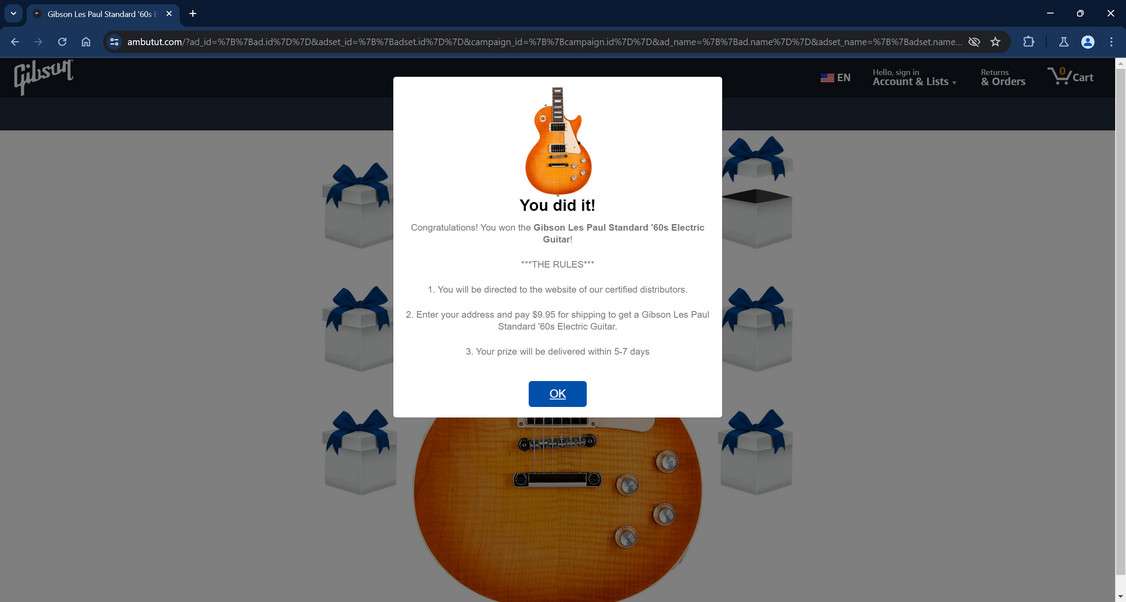
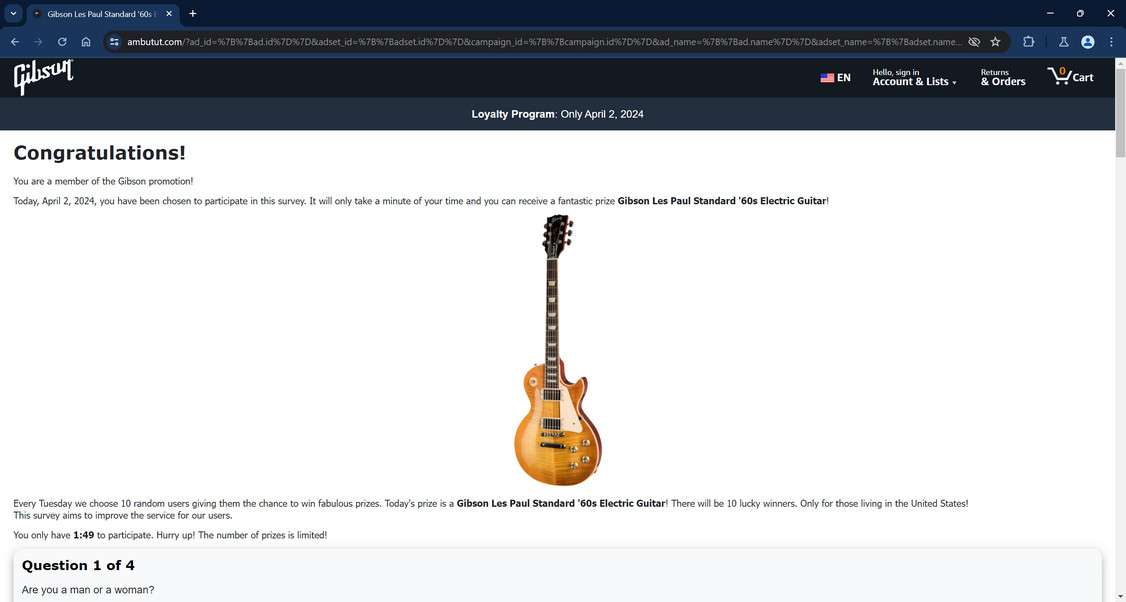
These phishing sites utilize real Sweetwater assets like logos, fonts, and the signature blue and green colors associated with Sweetwater’s authentic web presence.
The guitars are listed at the accurate retail value of $2,499 – $3,499. However, the scam page states they are discounted 100% to $0 as part of the fictional inventory clearance giveaway.
These showcase sites mimic the Sweetwater experience consumers trust, with the prominent customer service number, live chat, and financing options. But contact info leads nowhere, and the sites are hosted on deceptive domains.
4. Trick Users into Providing Payment Info
With defenses lowered believing they’ve landed an amazing deal, users are prompted to “confirm eligibility” by providing personal information and credit card details.
The stated reason is a reasonable $9.99 shipping and handling fee. After submitting card info, users will supposedly be shipped their free Les Paul Standard within 5-7 business days.
In reality, this sneaky request seals the scam – victims have now supplied the payment data scammers need to make the score. While no guitars are ever shipped out, victims’ cards are billed recurring fees in perpetuity.
5. Auto-Enroll Victims in Monthly Subscription Plans
By inputting credit card information, unwitting users are automatically signed up for expensive monthly subscription plans without their knowledge or consent.
These recurring charges often exceed $79 – $99 per month, racking up costs under nondescript service names. The initial $9.99 was simply to acquire the payment data.
Typically no confirmation emails or notifications are sent about the subscription enrollment. Ongoing fees continue until card companies shut down the charges or victims painstakingly hunt them down amongst monthly statements.
The result is the scammers profit endlessly while victims are left paying for nothing month after month. Only a small percentage identify and pursue refunds for these deceptive practices.
What to Do if You Fell Victim to the Sweetwater Gibson Guitar Scam
If you suspect you were deceived by the fake Sweetwater Les Paul giveaway and supplied personal or financial information, take the following steps right away:
- Contact your credit card provider immediately – Report the charges as fraudulent and cancel the card outright to prevent further billing. Monitor statements closely for related suspicious charges.
- Dispute any fraudulent fees – Work with your provider to contest all connected subscription fees or account charges. Supply evidence the transactions were scams to build your case.
- Change passwords – Update passwords for the card, related accounts, and any site or app that stored the compromised card number for payments. Enable two-factor authentication wherever possible.
- Place fraud alerts – Contact credit bureaus to place 90-day fraud alerts on your credit file so lenders are aware of potential identity theft. This also entitles you to additional credit reports.
- File police reports – For large fraudulent billings, file local police reports on the scam, which can aid credit card disputes. Also report the scam ads and websites to the FTC.
- Monitor your credit – Keep close watch on your credit reports with bureaus for any signs of further misuse of your personal and financial information. Security freezes can also help prevent criminals opening new fraudulent accounts.
- Seek other restitution – Consult legal options regarding the unauthorized use of Gibson’s trademarks and pursuing class action lawsuits around the broader scam operation.
By quickly addressing charges and taking preventative measures, victims can limit financial damage and further data exposure through this intricate scam.
Recognizing the Sweetwater Gibson Les Paul Guitar Scam (And Avoiding It)
Now that you understand the operational tactics behind this elaborate Gibson Les Paul giveaway scam, here are the key warning signs to recognize as you browse social media and the web:
- Look for urgency and scarcity – Promotions urging swift action due to limited supply or expiring offers are classic fraudster tactics. Comments like “Hurry, quantities are limited!” signal dubious motives.
- Watch for unbelievable price discounts – Extremely low prices on expensive, high-quality products like Les Pauls often indicate a scam. If it seems too good to be true, it almost always is.
- Verify remarkable claims – When ads or sites promote improbable giveaways or deals, independently verify them via official brands before providing personal data.
- Research unfamiliar domains – Check site domains match a company’s official URL. Unverified sites with typos or extra words are often facades.
- Analyze site details – Inspect sites closely. Phishing pages mimic legitimate companies but have mismatched logos, wrong colors, or missing certifications.
- Avoid “shipping fee” requests – Never provide payment information for supposed order fulfillment fees. This enables recurring billing without consent.
- Read terms and conditions – Scrutinize the fine print on any checkout page, especially unfamiliar sites. Look for hidden subscription sign-ups.
- Verify customer service contacts – Confirm listed support contacts route to real brand reps by calling published numbers. Fake sites provide bogus numbers.
- Avoid clicking social media ads – Be wary of flash giveaways or deals promoted via social media ads from unofficial pages. These often spearhead scams.
- Cross-reference deals – Compare remarkable claims or bargain prices against a company’s official website and spokespeople before buying in.
By watching for these warning signs, you can identify shady promotions preying on consumers through social engineering and outright deceit. If an offer raises any red flags, trust your instincts and avoid engagement.
Shutting Down the Les Paul Guitar Giveaway Scams
While staying vigilant is key, broader action is required to curb these fraudulent schemes long-term and prevent continued victimization. Concerned citizens can help crack down by:
- Reporting scam ads and domains – Use social site tools and domain registrars to flag fraudulent promotions and websites. The more removed, the less victims reached.
- Contacting brands – Ensure Sweetwater, Gibson, and media outlets impersonated are aware of the scam abusing their brands illegally. They can pursue action.
- Filing complaints – Submit scam details to the FTC, BBB, and FBI Internet Crime Complaint Center to prompt further investigations.
- Educating others – Spread awareness of common social media scams and manipulation tactics through digital literacy campaigns and resources.
With collective action and a more fraud-aware public, the profitability of schemes like the fabricated Les Paul giveaway will diminish. We can create an online landscape with far less opportunity for deception.
Here is a detailed, SEO-optimized FAQ covering the fake Gibson guitar giveaway scam targeting social media users:
Frequently Asked Questions About the Fake Gibson Guitar Giveaways on Social Media
1. How can I recognize these fraudulent Gibson guitar ads and promotions?
Be skeptical of remarkable claims like free high-value guitars for completing basic questions. Viral giveaways requiring any payment are always scams. Gibson and authorized sellers would never gift guitars for pennies.
2. What false narratives do the scam ads use across TikTok, Facebook etc.?
The ads cite excess inventory, minor cosmetic defects, labeling errors and misleading prices as phony reasons for gifting Les Pauls worth thousands. This is complete fabrication.
3. What deceitful techniques convince people the giveaways are real?
They use Gibson’s branding without consent, fake endorsements, rigged animations showing you “won,” and false urgency through countdowns and limited prizes.
4. What happens after you click on one of the scam’s social media ads?
You are directed through a series of phishing websites designed to harvest your personal and payment information through surveys and fake order forms.
5. How does providing your credit card result in unexpected recurring fees?
Hidden terms Sign you up for expensive monthly subscriptions without consent. A small shipping fee is charged immediately, followed by huge recurring charges.
6. What should raise red flags about these Gibson “freebie” offers?
No business gifts away products worth thousands for pennies or for completing basic questions. If it seems too good to be true, it always is.
7. How much do authentic Gibson Les Paul Standard models retail for?
The real Les Pauls targeted in these scams cost between $2,500 – $3,500 from authorized Gibson dealers, not a few dollars.
8. What precautions can I take to avoid falling victim to one of these scams?
Verify social media ads via Gibson’s real website and contacts. Never submit payment information or personal data without scrutinizing the claims.
9. What should I do if I already provided my information to a fake Gibson giveaway site?
Immediately contact your credit card company to report fraudulent charges. Monitor closely for hidden subscription fees. Change account passwords.
10. How can I help stop these fraudulent Gibson guitar giveaways on social media?
Report fake ads and sites. Spread awareness to protect others. Gibson pursues legal action – you can contact them with evidence.
The Bottom Line
In summary, malicious actors have constructed an intricate scam taking advantage of consumer trust in Sweetwater and Gibson. Through a sequence of deceptions, they convince victims they will receive free Les Paul Standard guitars worth thousands of dollars.
In reality, it is an elaborate ruse exploiting human psychology and technology like deepfakes to steal personal information and money. Equipped with the insights on their manipulative techniques, we can work together to recognize, resist, and ultimately shut down these criminal operations for good.

